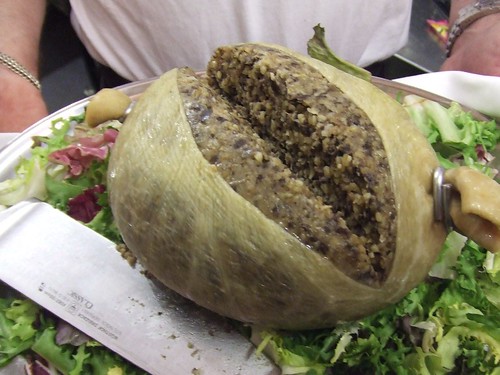Robert Burns Day, otherwise known as Burns Night, honors the birthday of Scottish poet, or makar, Robert Burns. Lovers of Burns, Scots poetry, and haggis gather together every January 25 to celebrate with a Burns supper, which involves a toast to the lassies, a recitation of Burns’ poetry, and the ingesting and imbibing of many Scottish eats and drinks.
For the first course, you may start with some cockieleekie, “soup made of a cock or other fowl boiled with leeks,” or Scotch broth, “a thick soup made from beef or mutton with vegetables and pearl barley.” Afterward is the “entrance of the haggis,” at which time bagpipes (or zampognas, gaidas, cornemuses, or loures) play some music, such as a pibroch, “a wild, irregular kind of music, peculiar to the Scottish Highlands, performed upon the bagpipe.” The word pibroch comes from the Scottish Gaelic piobaireachd, “pipe music,” which ultimately comes from the Latin pipare, “to chirp or peep.”
Just so you know what you’re in for, haggis is “a dish made of a sheep’s heart, lungs, and liver, minced with suet, onions, oatmeal, salt, and pepper, and boiled in a bag, usually the stomach of a sheep.” The origin of this word is unknown. It may come the Old French agace, “magpie,” playing on the idea “of the odds and ends the bird collects,” and the odds and ends in the dish. Another possible origin is the Middle English hagese, which may be related to haggen, “to chop.” Haggen also gives us haggle, perhaps with the idea of “hacking or chopping” prices.
[Photo: CC BY 2.0 by tjmwatson]
Along with haggis, Burns supper diners might also have some neeps, otherwise known as the rutabaga, the Swedish turnip, or the swede, and which “originated as a cross between the cabbage and the turnip.” The word neep may be a corruption of “new turnips.” Don’t forget your potatoes or tatties, which presumably comes from the -tat- of potato (see tater), or perhaps some clapshot, “a traditional Scottish dish comprised of boiled potatoes and boiled swede (or Scottish turnip) mashed together with chives.”
[Photo: CC BY 2.0 by tjmwatson]
While the origin of the word clapshot is unknown, World Wide Words speculates it may be similar to that of the Irish dish colcannon, a dish of “mashed potatoes and cabbage, seasoned with butter,” which was “pounded together in a mortar,” and “that vegetables such as spinach were formerly pounded with a cannon-ball,” hence, the cannon of colcannon. Col is derived from cole, or cabbage (see coleslaw). Clapshot may imply the clap or loud and sudden noise of a cannonball shot.
You may end the evening with some cranachan, “a traditional Scottish dessert made with whipped cream, whisky, oatmeal, honey, and raspberries.” The word is Gaelic in origin and originally referred to a kind of churn or “beaten milk.” A similar British dessert is syllabub.
Of course no Burns Night would be complete without Scotch whisky (otherwise known as usquebaugh, Gaelic for “water of life”), whether a dram, a tappit-hen, or a quaich. Too much usquebaugh? Try the Irn-Bru, a “fizzy orange-gold drink” touted as the Scottish hangover cure, or a few rounds of the Highland Fling, “one of the oldest of the Highland dances that originated in the Gaelic Highlands of Scotland,” and an ancient Scottish cure.
According to the Porridge Lady, to prevent a hangover before a ceilidh (from the Old Irish célide, “visit”) or a gilvarage (perhaps a combination of gild and ravage), have some crowdie.
And remember: we warned you about the haggis.


The laird proabbly refers to ‘lord’ i.e. tipsy landowner/boss, not layered…… Nice writin’ dan!